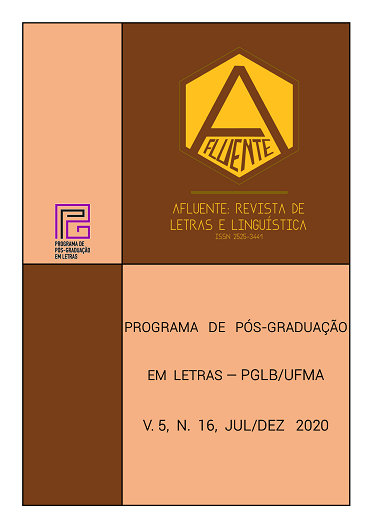ESTNE SIC TEMPUS? THE TIME IN SCIENCE FICTION FROM THE DIALOGUE BETWEEN THE WELLS MACHINE AND THE TUNNELS OF DARK
Palavras-chave:
Time, Science Fiction, Dark, The Time MachineResumo
Time can be chronological or psychological. Prost, for example, transforms seconds in long pages. In many other authors’ writings years, decades, centuries pass by the reader's eyes in just a paragraph. The cinema plays with time editing its scenes and the viewer watch a product whose time and space are dissipated and signified. In science fiction, time has led discussions about the unknown, presenting science the field of great innovations or the creator of great rashness.In The Time Machine, time reveals the future of post-human, something that no longer resembles what we know. On the other hand, in Dark, produced by Netflix, science is portrayed in a gloomy atmosphere and as pessimism concept. Both works discussed below seem to nourish from the incalculable power that time has on society. We aim to analyse time and narrative; science from the historical context of the creation of the works; time travel as a construct used by science fiction; mathematical theory of the fourth dimension; and physical theories regarding temporality.Downloads
Referências
BARROS, José D'Assunção (2012). Teoria da História: A escola de Annales e a Nova História. Petrópolis, RJ: Vozes.
COLAVITO, Jason (2008). Knowing Fear: Science, knowledge and the development of the Horror Genre. New York: McFarland Publisher, 2008.
CROTHERS, Stephen J (2014). “Wormholes and Science fiction”. Australia. [Transcript of the audio-visual presentation entitled: Fiction or Pure Fantasy?]. Avalible at: http://vixra.org/pdf/1410.0073v1.pdf.
DARK (2017). Directed by Baran Bo Odar e Quirin Berg. Germany: Netflix. Web series. (495 min).
BACK To The Future (1985). Directed by Robert Zemeckis. United States od America: Amblin Entertainment. Film (115min.).
HOLLINGER, Veronica (1987). Deconstructing the Time Machine. In: Science Fiction Studies, Vol. 14, No. 2, Critical Approaches to Science Fiction:Retrospects & Prospects, 1987.
MATT, Rebecca (2012). Back to the Future: The mechanics of temporality in H.G. Well’s The Time Machine. New York: University at Albany Scholar Archive, 2012.
RICOEUR, Paul (1990). Time and narrative: vol 1. Translated by Kathleen McLaughlin and David Pellauer. Chicago: The University of Chicago Press.
ROSSI, Cido (2017). Cybergothic. In: (org.) Cláudio Zanini, Cido Rossi. Vertigo/ Vertigo: vertentes do gótico no cinema. Rio de Janeiro: Bonecker.
STABLEFORD, Brian (2003). “Science fiction before the genre”. In: JAMES, Edward; MENDLESOHN, Farah. The cambridge companion to science fiction. Cambridge: Cambridge University Press.
THE NEW YORK TIMES. 23 nov. 2017. “With Dark, a German Netflix Series, Streaming Crosses a New Border”. Disponível em: https://www.nytimes.com/2017/11/23/arts/television/dark-a-german-netflix-series.html Acesso em: 04 jun. 2018.
WELLS, Herbet George (1895). The time machine. London: William Heinemann.
Downloads
Publicado
Como Citar
Edição
Seção
Licença
Direitos autorais Afluente: Revista Eletrônica de Letras e Linguística
Este trabalho está licenciado com uma Licença Creative Commons - Atribuição 4.0 Internacional.















